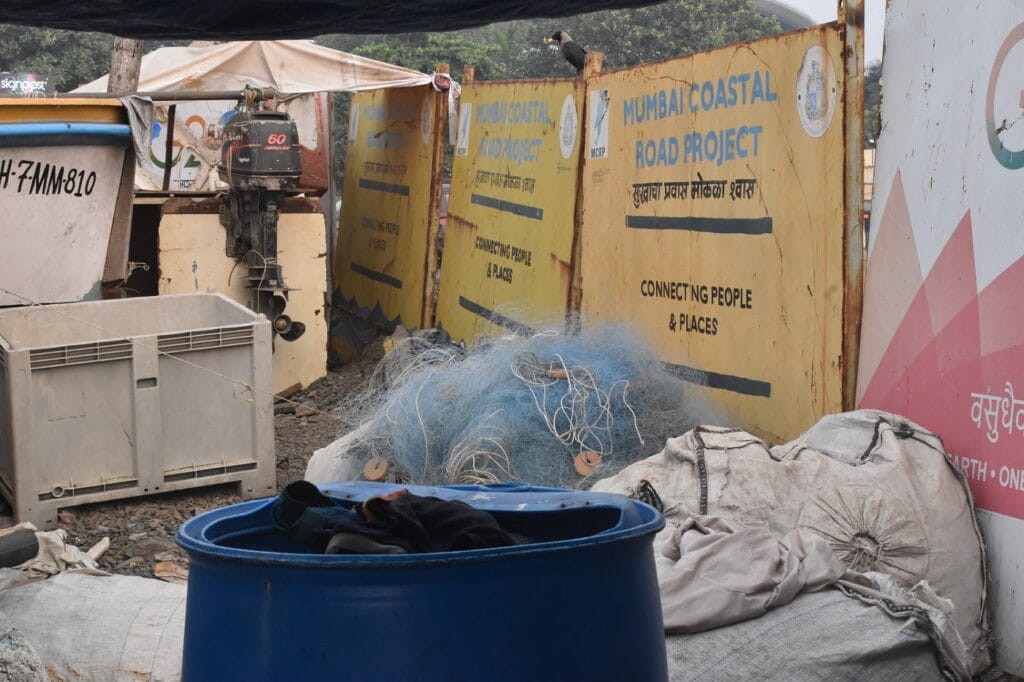Sanjay Baikar, a Koli fisherman has three boats parked at the Lotus jetty in Worli. The area, where his boats are parked, along with the many others, will soon be taken over by the Brihanmumbai Municipal Corporation (BMC) for the coastal road project.
The boats were parked at the north of the jetty before the ambitious project began. They were asked to move to the southern section, when the project took over that section of the jetty.
In August, the BMC asked the fishermen to move the boats to another location as they wish to take up this section too, for the project.
Where will the boats go?
Sanjay has not been able to use his boats since the coastal road work commenced.
He points to what is left of the jetty, an area that may not be more than 700 square feet.
“Where can we keep our boats?,” he asked, “Though the BMC has claimed that they have provided us an alternate place, they have not shown us a place where we can keep our boats. They have not shown us this place on paper or physically.”
A significant size of the remaining area is a slope that leads to the sea, where boats cannot be parked. The rest of the area is too small to park the boats. Besides, that area is also used for ancillary activities such as mending of nets and sorting of fish.
Sanjay alleges that the BMC purposely damaged their equipment and boats and called it ‘waste’.
Due to dwindling profits from the catch, the fishing community is finding it hard to repair their equipment. The engines of Sanjay’s boats have given way and his nets are damaged. He is unable to pay for the cost of repair as he would not be able to earn the required amount through fishing.
Read More: Drowning in debt: Mumbai’s fisherfolk struggle to survive extreme weather and dwindling catch

Appeals to the BMC
Vanchit Machhimar Haji Ali Sahkari Sangathana Maryadit (VMHASSM), of which Sanjay is a member, have been fighting for the rights of the fishing community at Worli since 2018. Ever since the coastal road project work began, they have been writing to the BMC demanding for space and compensation.
In the most recent letter to the BMC, VMHASSM wrote, “Deliberately/deliberately damaging boats/yachts and dinghies of the members of the organisation, which are in working condition/capable of fishing/suitable/in good condition, have discouraged our fishermen from their employment and caused starvation to the members of the organisation as well as their families.The prima facie damage to the livelihood is in the tune of Rs 90,00,00.”
Citizen Matters tried contacting BMC officials, but did not get a reply.
VMHASSM also filed an affidavit in the Bombay High Court (HC). When questioned by the HC, BMC informed that it will not prevent fishermen from using the Lotus jetty during construction of the coastal road.
However, they said the land was never intended for parking fishing vessels indefinitely. They also claimed that the petitioners had in 2020 brought the second-hand boats and requested the BMC to allow them to temporarily park the same on reclaimed land in the south of the jetty – to enable them to repair the boats and make them seaworthy.
However, VMHASSM maintains that the land is not reclaimed land and it always belonged to them. That is the reason it was recognised as a jetty in the first place.
Impact on livelihoods
“Before the coastal road work began, our catch used to be worth Rs. 70,000 to 1 lakh on a single day during season time,” said Sanjay. “It was worth Rs 20,000 to Rs 50,000 during the off season and we could catch the fish from just 7 kilometres away.”
Now, due to constant noise and light, fish move deeper into the sea. Even at 15 km, the catch is poor.
Mohuiddin Jeddy, another fishworker, took his boat into the sea after a gap of 10 days. His catch was just worth about Rs. 2000. “A single trip to the sea costs at least Rs. 3000. So we run into losses,” he said.
The money is further divided among 3-4 people leaving very little for individual fishers.
Allaudin Khan, secretary of VMHASSM, said, “We are unable to repair the boats due to the diminishing catch. We’ve spent so much money purchasing the boats, we can’t just discard them.”
Systemic exclusion
Sanjay speaks about how the authorities never included their voice or opinion at the time of approval of the coastal road proposal. It was much later that they realised that the jetty would slowly disappear. It was only in 2020, when VMHASSM filed a case in the court that the authorities started interacting with them. Even in 2020, a stakeholder meeting was held online, without the knowledge of the fishers.
Sanjay and Allaudin worry about being excluded from the development plans and processes. They are scared that systemic exclusion and discrimination will snatch the land they commonly owned since centuries from them, leaving them with no livelihoods.